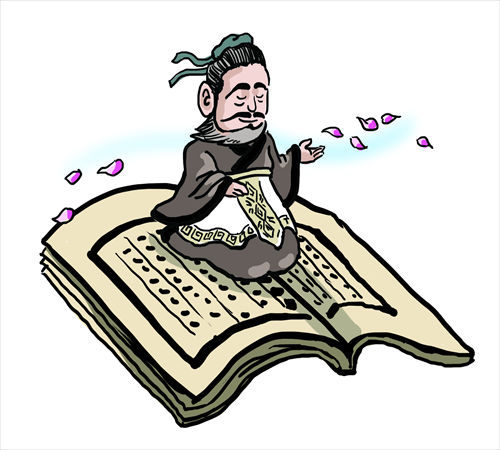Confucius pleads China's cause in Africa

Illustration: Liu Rui/GT
One major feature in Africa-China cooperation in recent years has been the establishment of Confucius Institutes in many African universities, where faculty from China provide instruction in Putonghua and offer programs on Chinese culture to African students.
Indeed, from the unstable Afghanistan to Britain, across the Atlantic to the US, the world is dotted with Confucius Institutes. To date, there are more than 480 Confucius Institutes operating on six continents globally. The majority of them are located on a university campus.
In many African countries, one can find Confucius Institutes. But it is the in the US where these Chinese institutions dominate.
Confucius Institutes have been compared to other bodies such as Britain's British Council, France's Alliance Française and Germany's Goethe-Institut. However, unlike these, Confucius Institutes operate within established education institutions.
In Africa, these institutes are known for providing funding, teachers and educational materials, an issue that has raised concerns over China government's influence on the continent's education quality.
In some quarters, critics see the infiltration of these institutes into African education system as an avenue for industrial espionage as well as China's deliberate strategy of advancing its soft power worldwide.
Sometimes, it is argued that those institutions hosting Confucius Institutes enjoy higher popularity, reputation, more social influence, enabling them to generate more support from local communities.
While the Chinese government partly carries the burden of funding Confucius Institutes with local universities in different countries, it has been lauded for its hands-off approach to management.
This means each institute is free to come up with its own curriculum and manage its finances.
At the moment, there are a number of restrictions on how the funds are used. For instance, in Africa, the education plans developed by different institutes have to get a nod from Confucius Institute headquarters.
And some of the Institutes are governed by a board composed of several members from the Chinese partner school, while other members come from the local institutions. The head of the Institute is usually appointed from the local partner institutions.
These issues, however, are seen as minor punctures that would not stop the vehicles' tyres from moving forward. To many Africans, these institutes not only make Africa better understand China through the promotion of Chinese language and culture, they also deepen the cooperation that locals warmly share.
At the moment, there is a growing pressure, especially from the civil society, mainly funded by the Western countries, claiming that Confucius Institutes have nothing to do with academic excellence in Africa, but bear more political significance.
The problem with such criticisms is that it often leaps from suspicions and concerns to a conclusion of fact. A small number of anecdotal cases are repeated to support broader charges that the Confucius Institutes will cause harm not only to African academic life, but globally.
Now with over 100 Institutes in the US, there is ample experience on which we can evaluate how these institutes have interacted in practice with the global academia. There is little evidence that the existence of Confucius Institutes threatens the robust atmosphere of academic freedom globally and that they are used to push China's political agenda.
China may indeed hope that greater familiarity with Chinese culture will reap soft power benefits for the country. The US and even the UK have traditionally also promoted international exchanges, hoping that such exchanges will deliver soft power benefits for them.
China is trying to make these institutes' operations more transparent. Hosting countries, too, should be given more roles to play in their running, so that the local community can draw a greater deal of benefits.
African countries can also launch similar institutes, which will help it market African culture and language abroad. This will go a long way in furthering the China-Africa relations.
The author is a journalist and a security analyst in East Africa. opinion@globaltimes.com.cn